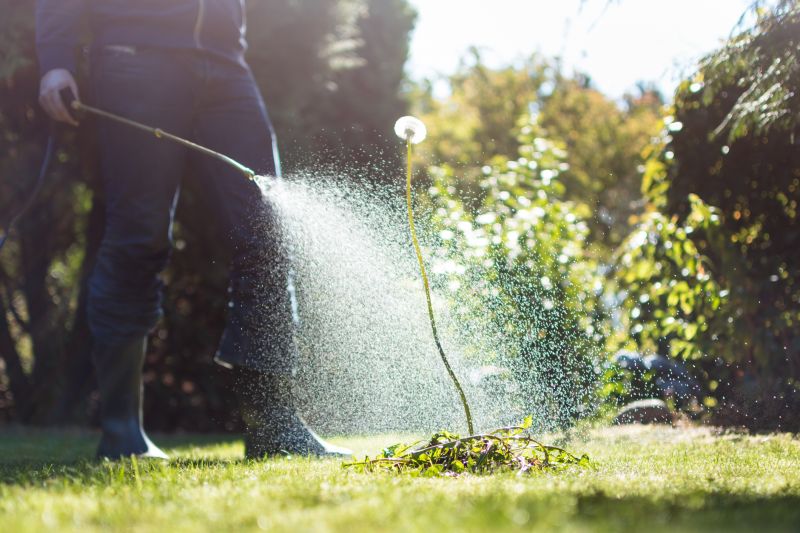Expert Picks Of Leading Weed Control Solutions
Review the most recommended weed control products that deliver consistent performance for various garden needs.
 Controlling weeds effectively is a common concern for gardeners, landscapers, and property owners alike. A variety of products are available to help manage unwanted plants and maintain healthy, attractive outdoor spaces. These products range from chemical herbicides to natural alternatives, each suited to different needs and preferences. When selecting a weed control product, it is important to consider factors such as the type of weeds, the area size, and the application method to ensure optimal results.
Controlling weeds effectively is a common concern for gardeners, landscapers, and property owners alike. A variety of products are available to help manage unwanted plants and maintain healthy, attractive outdoor spaces. These products range from chemical herbicides to natural alternatives, each suited to different needs and preferences. When selecting a weed control product, it is important to consider factors such as the type of weeds, the area size, and the application method to ensure optimal results.
Top Overall Option
Multipurpose Weed Control Solution
A versatile weed control product that offers broad-spectrum effectiveness suitable for various outdoor settings. It is designed for easy application and can be used on different surfaces, making it a practical choice for homeowners and professionals alike.
Types of Products For Weed Controls
Liquid Herbicides
Concentrated or ready-to-use liquids that can be sprayed directly onto weeds for quick application and visible results.
Granular Herbicides
Powdered or pelletized formulas spread over soil or turf, providing weed suppression over larger areas.
Organic Weed Killers
Natural solutions made from ingredients like vinegar or essential oils, suitable for those seeking chemical-free options.
Manual Weeding Tools
Hand tools such as weed pullers, hoes, and cultivators designed for physical removal of weeds.
Landscape Fabric and Mulches
Physical barriers and organic mulches that prevent weed seeds from germinating and growing.
Vinegar-Based Sprays
Acetic acid solutions used as natural herbicides, effective primarily on young or small weeds.
Foam Weed Killers
High-viscosity foam formulations that cling to weeds for targeted application, reducing drift and overspray.
Pre-Emergent Herbicides
Products applied before weed seeds germinate to prevent weed growth altogether.
Post-Emergent Herbicides
Designed to target weeds after they have emerged, providing immediate control.
Selective Herbicides
Formulations that target specific types of weeds while sparing desirable plants.
Non-Selective Herbicides
Broad-spectrum products that kill most plants they contact, suitable for clearing areas.
Solarization Sheets
Clear plastic covers used to heat soil and kill weed seeds through solar energy.
Herbicide Sticks
Targeted applicators for spot treatment of weeds with minimal chemical use.
Brush Killers
Specialized products for controlling woody or tough weeds, often used on shrubs or invasive plants.
Herbicide Mats
Physical mats that suppress weed growth in garden beds or pathways.
Popular Choices
Widely used for their quick action and ease of application across various outdoor areas.
Commonly chosen for large-scale applications and long-lasting control.
Popular among those seeking chemical-free weed management options.
Favored for precise removal and minimal chemical use, especially in small gardens.
Frequently used to create weed barriers in garden beds and pathways.
Chosen for preventing weeds before they sprout, especially in lawn care.
Selected for quick control of visible weeds after emergence.
Popular for organic gardening and environmentally conscious practices.
Growing in popularity for targeted treatment with minimal overspray.
Convenient for spot treatments and controlling invasive weeds.
Often used in lawns and flower beds to preserve desired plants.
Effective in summer months for soil sterilization and weed seed control.
Utilized in pathways and garden beds to block weed growth effectively.
Many weed control solutions are designed for specific environments, such as lawns, flower beds, or vegetable gardens. Chemical herbicides often provide quick and effective results, but they require careful handling and application to avoid damage to desirable plants. Non-chemical options, including organic weed killers and manual tools, offer alternatives for those seeking to minimize chemical use. Proper application and timing are critical to achieving the best results and preventing weed regrowth.
In addition to herbicides, there are physical barriers like landscape fabric and mulches that can suppress weed growth before it starts. These methods are often used in combination with other controls for comprehensive weed management. Regular maintenance, such as pulling weeds by hand and maintaining healthy plant growth, also plays a vital role in keeping weeds under control. Overall, selecting the right products and strategies depends on your specific landscape needs and personal preferences.
Key Buying Considerations
- Identify whether the product is suitable for the specific type of weeds you are targeting.
- Consider the area size to determine the quantity and coverage needed.
- Decide between chemical and natural options based on personal preferences and use case.
- Check if the product is selective or non-selective to avoid damaging desirable plants.
- Review application methods to ensure they match your gardening skills and equipment.
- Look for products with clear instructions for safe and effective use.
- Evaluate the longevity and residual effect of the product for long-term control.
- Assess whether the product is safe for children, pets, and other wildlife in your area.
- Consider the environmental impact, if relevant, especially for chemical herbicides.
- Examine compatibility with existing lawn or garden care routines.
- Check for any necessary protective gear or precautions during application.
- Determine if the product is suitable for use on different surfaces like concrete, soil, or mulch.
- Review user ratings and feedback for insights into real-world effectiveness.
- Be aware of any local regulations or restrictions related to herbicide use.
- Consider cost-effectiveness based on coverage and frequency of application.
This page contains affiliate links. We may earn a commission if you purchase through these links, at no additional cost to you.
